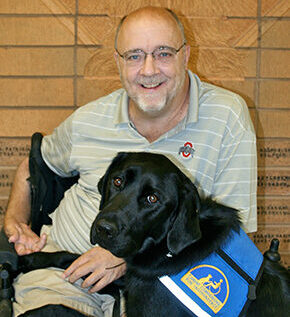
When Dan was a part of the North Central Region’s first graduating class, he didn’t know that he was starting a lifetime partnership. The year was 1987 and Dan got a phone call inviting him to the newly founded North Central Region of Canine Companions for Independence to receive his first assistance dog.
“I always had a dog, so after my injury it came naturally for me to want an assistance dog. I ended up with my first service dog, Troubadour,” remembers Dan. “Within the first month of having Troubadour, I was at the grocery store when my wedding ring fell to the ground and rolled under a shelf. I thought I’d see what this dog could do and he went and got the ring, brought it to me and dropped it right in my hand. It was amazing! I didn’t have to ask anyone for help!” Dan found that having an assistance dog allowed him to successfully manage his busy family life and teaching career.
After Troubadour’s retirement, Dan worked with successor service dogs Ingenito, Balin and, most recently, Michael III.
“Canine Companions has impressed me for 30 years,” says Dan. “The dogs, the staff, the training—it’s just an outstanding organization.” While Canine Companions has remained dedicated to its mission, the methods have changed a bit since Dan received his first dog.
Dan says that the breeding program is where he sees the most difference between 1987 and now. He has noticed the difference in dispositions, calmness and length of working life.
All the dogs in 1987 were taught 88 commands, which Dan and other graduates found confusing, as did the dogs. “Troubadour just couldn’t keep track of all the commands,” laughs Dan. “The 40 or so commands that the dogs know now are much more workable from a graduate point of view.”
Another big change has been in the graduate program. Today a robust graduate follow-up program is in place to ensure that all teams are healthy and working together effectively for the life of the dog.
“I tell people that you just can’t go wrong with Canine Companions,” says Dan.

